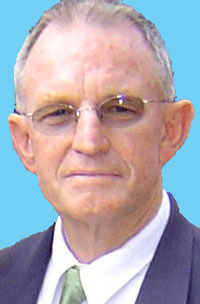Messenger served as the founding editor and publisher of Dance Australia Magazine, established in 1980. [9] [10] Messenger's contributions to the magazine earned two national arts awards. The first, awarded for "Services to Dance," was presented during the inaugural National Dance Awards at the Sydney Opera House in May 1997. [11] The second was an Australian Dance Award for "Outstanding Achievement in Dance Education" in 2008, presented at the Arts Centre in Melbourne on June 15. [11] : 2008 Awards
Civil celebrant
Messenger has been involved in the civil celebrant program, initially within Australia and subsequently in other English-speaking countries. On 26 January 1970, Messenger was the first individual to apply for the position of a Civil Marriage Celebrant under the provisions outlined in the Commonwealth Marriage Act of Australia of 1961. [12] In the 1970s, he was an advocate for civil marriage reform, supporting the Whitlam Government's Attorney-General Lionel Murphy who, on 26 July 1973, by appointing Lois D'Arcy, had introduced civil marriage celebrants into the Australian cultural scene. Messenger was appointed as a Civil Marriage Celebrant by Murphy in February 1974. Murphy appointed him first secretary of the Association of Civil Marriage Celebrants of Australia (ACMCA). [4]
Messenger was a founder and inaugural president of Funeral Celebrants Association of Australia. [13] In January 1994 he was elected the foundation president of the Australian Federation of Civil Celebrants Inc who, on 26 May 1996, honoured him with Life Membership. [4]
Messenger was prosecuted for violating Victorian consumer law, accused of attempting to manipulate the fees charged by civil celebrants for funeral services. Messenger contended that his intention was not to fix fees but to pressure funeral directors into raising the fixed fees established through long-standing collaboration among themselves. [14] In 2007, he pleaded guilty to attempting to induce individuals to contravene section 45(2)(a)(ii) of the Competition Code of Victoria and was fined $46,000, in addition to covering his own legal costs amounting to $20,000. [15] Messenger and his supporters persist in asserting that the Australian public is poorly served by a system that grants funeral directors significant control over the conditions and compensation of celebrants. [16] [17] [18] [19]
Messenger was an early advocate for the legalisation of same-sex marriages. As early as 1979, he introduced commitment ceremonies for same-sex couples. [4] : pp.143ff
In the 1990s Dally Messenger was active in spreading the civil celebrancy movement to New Zealand and the UK, countries where it was less well established. He was invited to New Zealand as guest keynote speaker at three annual conventions in the 1990s and in 2000. These were in Christchurch, organised by celebrant Frank Crean on 27 June 1998; in Hamilton, organised by celebrant Yvonne Foreman on 23 July 1999 and in Auckland, organised by celebrant Sherryl Wilson on 27 July 2001. [20]
In 2000-2002, Messenger was the key training instructor in establishing civil celebrancy in the US. He gave the launching address to the newly formed Celebrant USA Foundation in New Jersey on 5 June 2002 at the Montclair Library. [21] [22]
In 1995 he established the International College of Celebrancy. [23] Messenger has often been a critic of bureaucrats in the Australian Attorney-General's department who tried to reduce the training requirements for persons appointed as celebrants. [24]
Messenger lives in Melbourne with his wife since 2005, Remi Barclay Messenger(née Barclay, a.k.a. Bosseau). [25]
